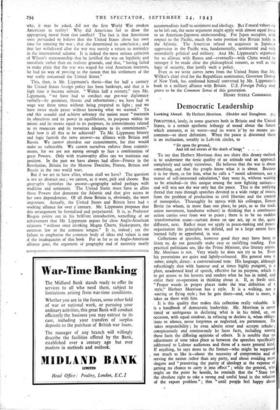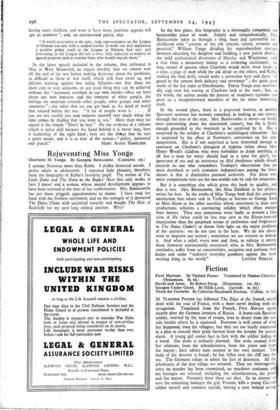Democratic Leadership
Looking Ahead. By Herbert Morrison. (Hodder and Stoughton. 55.) PERCEPTIBLE, lately, in some quarters both in Britain and the United States, is a certain apathetic lethargy of mood about the future which amounts, at its worst—and its worst is by no means un- common—to sheer defeatism. When the peace is discussed there is an inclination, notably in heft-ish circles, to
"Sit upon the ground, And tell sad stories of the death of kings" . . .
To say that Herbert Morrison does not share this dreary outlook is to understate the tonic quality of an attitude and an approach completely and sanely victorious. He believes that the war is about something, and that the people know what it is about. Because it is for them, as for him, what he calls a " moral adventure, not a matter of self-interested calculation," they went in, without waiting to be attacked—in this unique among the now fighting nations— and will win not the war only but the peace. This is the unifying thread that runs through speeches devoted to a wide range of issues, from the problem of production to civil liberties and the control of monopolies. Thoroughly he agrees with his colleague, Ernest Bevin (to whom, in more than one place, he pays, as to the trade union movement, handsome tribute) in thinking that a continuous action carries over from war to peace ; there is to • be no sudden transformation scene—curtain down on ape act, up to the, quite different, next. Rather -mint we apply in peace-making and peace- organisation the principles we defend, and to n large extent have learned fully to apprehend, in war.
Collections of speeches, however good they may have been to listen to, do not generally make easy or satisfying reading. Few practical politicians are, like the Prime Minister, also literary artists. Mr. Morrison is not. Very wisely he does not try to be. Even his perotations are quiet and lightly-coloured. His general tone is sober, simple, direct: a conversational tone. His language, although refreshingly shot with humour and at times highly pungent; is a plain, unadorned kind of speech, effective for its purpose which is to get across to his hearers and readers what he has in ;nind, and enlist their co-operation in thinking about it. If, as Swift said, " Proper words in proper places make the true definition of a style," Herbert Morrison has a style. It is a walking, not a soaring or flying style ; but he gets there—and, what is more, it takes us there with him.
It is this quality that makes this collection really valuable. It is a handbook of democratic. leadership. Mr. Morrison is never timid or ambiguous in declaring 'what is in his mind, or, on occasion, with equal candour, in refusing to declare it, when obliga- tions to silence, never forgotten or neglected, are paramount. He takes responsibility ; he even admits error and accepts rebuke ; conspicuously and continuously he faces facts, including among those facts the differing opinions of others. It is notable that no adjustment of tone takes place as between the speeches specifically addressed to Labour audiences and those of a more general kind. If anything, he says more to the former—who might be supposed not much to like it—about the necessity of compromise and of serving the nation rather than any party, and about avoiding mere slogans and " preserving the purity of ideology at the expense of getting no chance to carry it into effect " ; while the general, who might on the point be hostile, he reminds that the " State has the absolute right to take a strong and useful hand in the solution of the export problem" ; that "until people feel happy about
having more children, and want to have more, 'patriotic appeals will get us nowhere "; and, on international policy, that "A world association is the ; luny representative (as the League of Nations was not) with a unified resolve to work out and implement a positive policy (such as the League of Nations had not) and possessing (as the League did not; a force fully sufficient to achieve its agreed purposes and to restrain those who would impede them."
In the latest speech included in the volume, that delivered in May at West Bromwich, he argues forcibly that we cannot wait till the end of the war before making decisions about the problems, as difficult as those of war itself, which will then await us, and delivers warning against two ruling fallacies—one that there are short cuts or easy solutions, or any good thing that can be achieved without the " necessary overhaul in our own minds—ideas we have about our own interests and the interests of other peop:e, the feelings we entertain towards other people, other groups and other countries " ;. the other that we can get back to the kind of world that existed before the war. " A lot of people want it. . . If you are not careful you may surprise yourself very much when the time comes by finding that you want it, too." More than once his appeal is the simple " Don't be lazy." On the evidence of a volume which is never dull because the hand behind it is never lazy, here is leadership of the right kind ; here are the things that he says a party needs, and it is as true of the nation—" policy, personnel



























 Previous page
Previous page